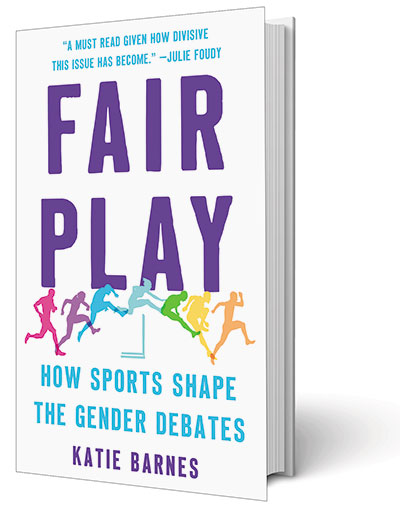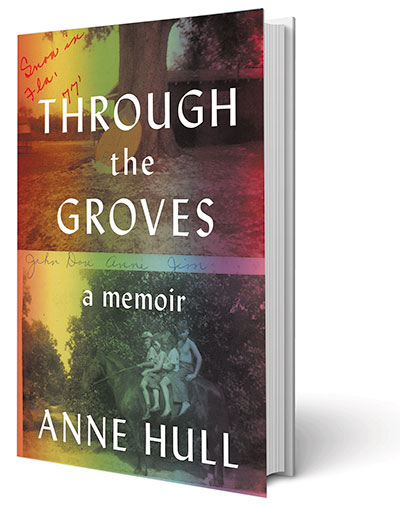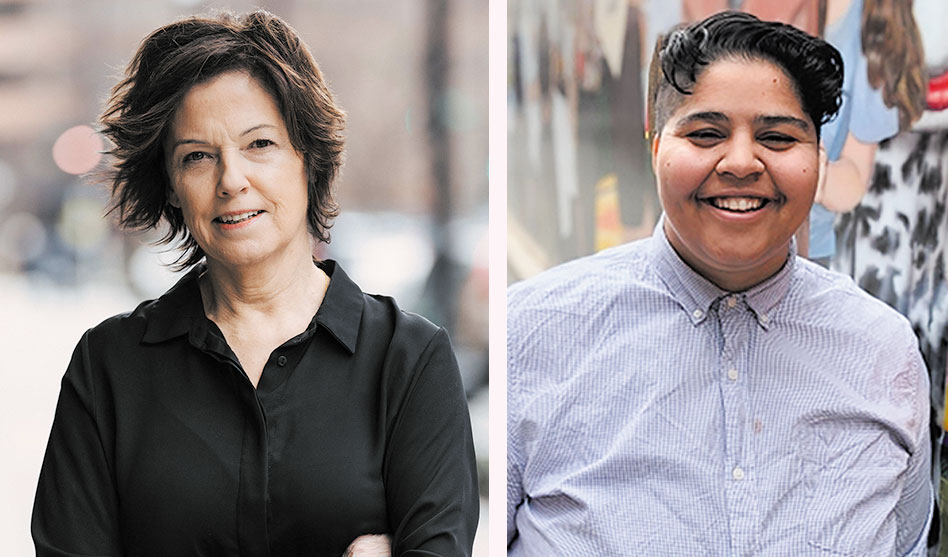Annie Hull, left and, Katie Barnes, right
In 2 new books, one author explores the role of gender in sports, while another brings back the days of their youth
TERRI SCHLICHENMEYER | Bookworm Sez
BookwormSez@aol.com
 Fair Play: How Sports Shape the Gender Debates by Katie Barnes; c.2023, St. Martin’s Press; $29; 304 pages.
Fair Play: How Sports Shape the Gender Debates by Katie Barnes; c.2023, St. Martin’s Press; $29; 304 pages.
The jump shot happened so quickly, so perfectly. Your favorite player was in the air in a heartbeat, basketball in hand, wrist cocked. One flick, and it was all swish, three points, just like that, and your team was ahead.
So, are you watching men’s basketball or women’s basketball? Or, as in the new book, Fair Play by Katie Barnes, should it really matter?
For sports fans, this may come as a surprise: We categorize sports according to gender.
Football, baseball, wresting: male sports. Gymnastics, volleyball: women’s sports. And yet, one weekend spent cruising around television shows you that those sports are enjoyed by both men and women — but we question the sexuality of athletes who dare (gasp!) to cross invisible lines for a sport they love.
How did sports “become a flash point for a broader conversation…”?
Barnes takes readers back first to 1967, when Kathrine Switzer and Bobbi Gibb both ran in the Boston Marathon. It was the first time women had audaciously done so, and, while both finished the race, their efforts didn’t sit well with the men who made the rules.
“Thirty-seven words” changed the country in 1972 when Title IX was signed, which guaranteed there’d be no discrimination in extracurricular events, as long as “federal financial assistance” was taken. It guaranteed availability for sports participation for millions of girls in schools and colleges. It also “enshrine[d] protections for queer and transgender youth to access school sports.”
So why the debate about competition across gender lines?
First, says Barnes, we can’t change biology, or human bodies that contain both testosterone and estrogen, or that some athletes naturally have more of one or the other — all of which factor into the debate. We shouldn’t forget that women can and do compete with men in some sports, and they sometimes win. We shouldn’t allow over-inflated numbers of trans athletes to stand, and we shouldn’t ignore the presence of transgender men in sports.
What we should do, Barnes says, is to “write a new story. One that works better.”
Here are two facts: Nobody likes change. And everybody has an opinion.
Keep those two statements in mind when you read Fair Play. They’ll keep you calm in this debate, as will author Katie Barnes’ lack of flame-fanning.
As a sports fan, an athlete, and someone who’s binary, Barnes makes thing relatively even-keel in this book, which is a breath of fresh air in what’s generally ferociously contentious.
There’s a good balance of science and social commentary here, and the many, many stories that Barnes shares are entertaining and informative, as well as illustrative. Readers will come away with a good understanding of where the debate lies.
But will this book make a difference?
Maybe. Much will depend on who reads and absorbs it.
Barnes offers plenty to ponder but alas, you can lead a homophobic horse to water but you can’t make it think. Still, if you’ve got skin in this particular bunch of games, find Fair Play and jump on it.
………………..
Through the Groves: A Memoir by Anne Hull; c.2023, Henry Holt; $26.99; 224 pages.
 You can’t see the forest for the trees. Fluffy pines, and oaks that started growing before your parents were born. Tall willows, towering cottonwoods that create a canopy far above you. The forest soothes your mind; if you have an out-of-control imagination, it offers a good scare.
You can’t see the forest for the trees. Fluffy pines, and oaks that started growing before your parents were born. Tall willows, towering cottonwoods that create a canopy far above you. The forest soothes your mind; if you have an out-of-control imagination, it offers a good scare.
Nature’s there, and in the new book Through the Groves by Anne Hull, you’ll find memories, too.
She still recalls the smell and the heat and the pesticides. Anne Hull was her daddy’s sidekick the summer she was 6 years old, riding along with him on his job as a fruit buyer in the middle of Florida, where rows of orange trees stretched for miles. Together, they visited the dusty, scarred, older Black men who worked the groves on her father’s route, and her father taught her all about “withholding confidential information” and not telling her mother about using a chalky field as a bathroom or about the gun in his car.
Hull’s mother already knew about the roadside stops he made, and the bars along his way home: The ride-alongs Hull so enjoyed were meant to deter her father from “Friday afternoon fever” and bright neon beer signs.
Back then, Hull was only starting to notice that her family moved often, from one ramshackle house to another, and she saw the weekly checks her great-grandmother gave her father. She already knew that adults kept secrets that weren’t so secret to a growing girl who was obsessed with being a spy someday. These were adventures, just like the adventures she had with cousins and her little brother, who was an accident-prone “calamity.”
When Hull’s mother left Hull’s father and moved in with Hull’s grandmother, that was an adventure, too — until it wasn’t. Hull had become old enough to understand genteel poverty and that hand-me-downs weren’t cool. She bonded with her grandmother over music; sneered at her mother as teenagers do, and she thought about her dad, but only in the abstract.
He never forgot about her, though. He never stopped trying to be her father.
Do you really want some treacly life story now? Nah, you want something solid and sincere, right? Something different. Part coming-of-age, but more, maybe.
You want Through the Groves.
Rather than opening this tale where most childhood memoirs start, with eye-rolling, attitudinal teen years, author Anne Hull’s story begins the summer she was 6 years old, and they move forward from there. This gives readers the gift of an observant kid’s-eye view of life — one that’s older than its years and doesn’t miss a thing, but that’s not insufferably precious or precocious.
Viewed through the lens of a grown-up, then, those early memories give readers the “more” they crave, becoming a triple-whammy of coming-of-age, coming out, and coming to terms with the frailty of family. That’s sharp as flint but also hilarious.
Hull says her father was a storyteller, and this orange apple doesn’t fall far from the tree. Start Through the Groves, and you’ll find that you just can’t leaf it.

